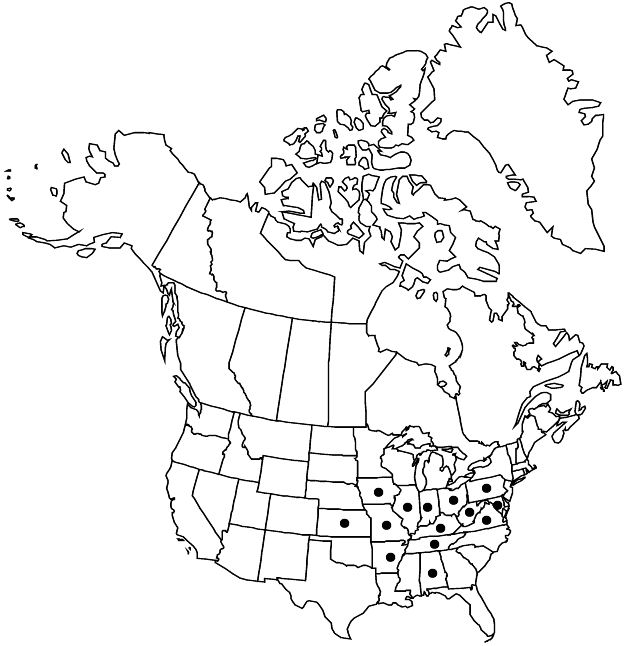Acalypha deamii
Vasc. Pl. Illinois, 301. 1955.
Herbs, annual, 3–7 dm, monoecious. Stems erect, glabrate. Leaves: petiole 2.5–7 cm; blade ovate to broadly rhombic, 4–12 × 2–7 cm, base obtuse, margins serrate, apex acute to acuminate. Inflorescences bisexual, axillary; peduncle 0.1–0.6 cm, pistillate portion 0.8–1.5 × 1–2 cm or pistillate bract solitary, staminate portion 0.3–0.7 cm; allomorphic pistillate flowers common, solitary in axils near base of stem. Pistillate bracts (normal flowers) loosely arranged to crowded (inflorescence axis clearly to scarcely visible between bracts) or solitary, 8–16 × 11–20 mm, abaxial surface sparsely pubescent and usually stipitate-glandular; lobes (5–)7–9, lanceolate to narrowly oblong, 1/2–3/4 bract length; of allomorphic flowers absent. Pedicels of allomorphic flowers rudimentary. Pistillate flowers: pistil 2-carpellate (normal flowers), 1-carpellate (allomorphic flowers); styles multifid or laciniate. Capsules smooth, pubescent; allomorphic fruits obovoid, 2.5–3 × 1.8–2 mm, spiny, pubescent. Seeds 2.4–3.2 mm, shallowly pitted.
Phenology: Flowering and fruiting late summer–fall.
Habitat: Moist bottomland woods, near streams or rivers, rarely in moist upland forests.
Elevation: 100–400 m.
Distribution

Ala., Ark., Ill., Ind., Iowa, Kans., Ky., Md., Mo., Ohio, Pa., Tenn., Va., W.Va.
Discussion
Acalypha deamii strongly resembles robust individuals of A. rhomboidea but is generally restricted to moist bottomland woods. Some accounts state that the leaves of A. deamii droop; this characteristic is not consistent and cannot be used for identification.
The distribution of Acalypha deamii is probably not as patchy as collections suggest. It is frequently overlooked because it looks so much like the widespread and abundant A. rhomboidea and is difficult to recognize until fruits mature. Collections may also be limited because A. deamii shares its habitat with stinging nettles.
Selected References
None.